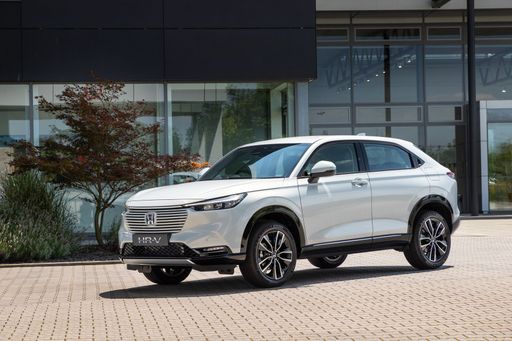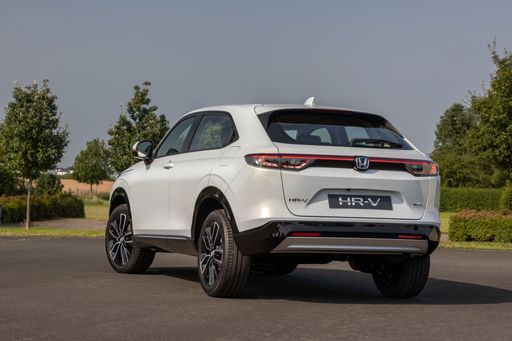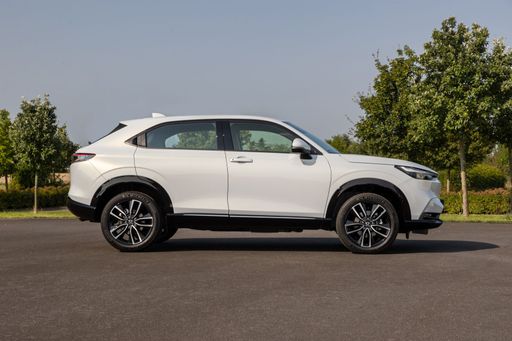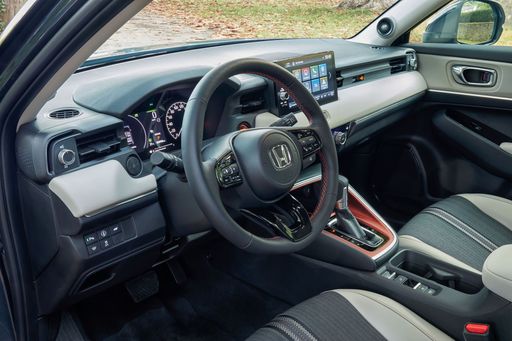Honda HR-V VS Toyota Yaris Cross
The Honda HR-V and Toyota Yaris Cross are two compelling subcompact SUVs that cater to the growing demand for versatile and efficient vehicles. The HR-V impresses with its spacious interior and innovative Magic Seat, offering unmatched flexibility for cargo and passenger needs. In comparison, the Yaris Cross stands out with its strong hybrid performance and advanced safety features, making it an appealing choice for eco-conscious drivers.
Honda HR-V
The Honda HR-V impresses with its sleek design, combining a dynamic exterior with a comfortable and spacious interior. This versatile compact SUV offers a smooth and responsive driving experience, making it ideal for both city commuting and weekend adventures. Equipped with advanced safety features and technology, the HR-V ensures a connected and secure journey for all passengers.
详细信息Toyota Yaris Cross
The Toyota Yaris Cross combines the practicality of a compact SUV with the agility of a smaller car, making it ideal for urban adventures. Its elevated seating position offers excellent visibility, while the stylish design ensures it stands out on the city streets. Inside, the Yaris Cross boasts a modern interior with advanced technology features designed to enhance the driving experience.
详细信息Honda HR-V vs. Toyota Yaris Cross: A Comprehensive Comparison
With the ever-increasing demand for compact SUVs, car enthusiasts are often faced with the challenge of choosing between impressive models like the Honda HR-V and the Toyota Yaris Cross. Both vehicles offer innovative technologies, efficiency, and practicality, making them strong contenders in the segment. In this article, we’ll delve into various aspects of both models, comparing their performance, specifications, and innovative features.
Powertrain and Performance
The Honda HR-V is powered by a full hybrid system generating a robust 130 HP (96 kW) from its 1.5-liter engine, featuring a 4-cylinder layout. This setup allows the HR-V to deliver impressive torque figures of 253 Nm, ensuring a responsive driving experience. With a CVT automatic transmission and front-wheel drive, the HR-V accelerates from 0-100 km/h in approximately 10.6 seconds, reaching a top speed of 170 km/h.
In contrast, the Toyota Yaris Cross also employs a full hybrid engine but offers two distinct power outputs: 116 HP (85 kW) and an impressive 130 HP (96 kW). The engine is a slightly smaller 1.5-liter 3-cylinder unit. The Yaris Cross takes around 11.2 seconds to reach 100 km/h, with a maximum speed similar to the HR-V at 170 km/h. While it offers competitive acceleration, it's slightly less agile than its Honda counterpart.
Fuel Efficiency and Emissions
When it comes to fuel efficiency, the Toyota Yaris Cross holds a clear advantage. Its consumption figures range from 4.5 to 4.8 L/100 km, depending on the powertrain variant chosen. This efficiency translates into lower CO2 emissions of 101 to 108 g/km, placing it in the eco-friendlier CO2 efficiency class C.
On the other hand, the Honda HR-V is not too far behind with a consumption rate of 5.4 L/100 km and CO2 emissions at 122 g/km, landing it in class D. While both vehicles are hybrids, the Yaris Cross takes the lead in terms of environmental impact, showcasing its advanced efficiency technologies.
Interior Space and Comfort
Interior comfort is another critical factor to consider when comparing these two SUVs. The Honda HR-V offers generous passenger space and a trunk capacity ranging from 320 to 335 liters, providing ample storage for everyday needs. It comfortably seats five individuals while maintaining a curb weight of 1452 kg, which adds to its robust feel.
The Toyota Yaris Cross impresses with a total trunk capacity of 397 liters, making it a more practical option for those who require extra cargo space. With a ceiling height of 1595 mm, it ensures a slightly more spacious interior feel compared to the HR-V. Additionally, the Yaris Cross has a lower curb weight ranging from 1180 to 1290 kg, enhancing its nimbleness on the road.
Dimensions and Design
Dimensions play a critical role in a vehicle’s appeal and usability. The Honda HR-V measures 4340 mm in length, 1582 mm in height, and comes with five doors, offering a modern yet practical aesthetic. The exterior design matches Honda’s bold styling approach, giving it a formidable presence on the road.
The Toyota Yaris Cross is slightly shorter at 4180 mm but is also wider, measuring 1765 mm. The increased height of 1595 mm contributes to its rugged SUV look and makes it more suitable for off-road adventures. Both models present attractive designs, but the Yaris Cross may appeal more to those looking for aggressive off-road styling.
Concluding Thoughts: Which SUV Prevails?
The Decision between the Honda HR-V and Toyota Yaris Cross ultimately depends on your priorities. If you seek superior fuel efficiency, lower emissions, and additional trunk space, the Yaris Cross is an excellent option. Alternatively, if performance, torque, and an upscale driving experience are your primary concerns, the HR-V stands tall.
In this head-to-head matchup, both vehicles have unique strengths that cater to different consumer needs. With the automotive market constantly evolving, potential buyers should always consider personal preferences and requirements when shooting for their next SUV investment.
 @ hondanews.eu
@ hondanews.eu
 @ hondanews.eu
@ hondanews.eu
 @ hondanews.eu
@ hondanews.eu
 @ hondanews.eu
@ hondanews.eu
 @ Toyota
@ Toyota
 @ Toyota
@ Toyota
 @ Toyota
@ Toyota
 @ Toyota
@ Toyota
 @ Toyota
@ Toyota
 @ Toyota
@ Toyota
 @ Toyota
@ Toyota

|

|
|
|
|
成本和油耗 |
|
|---|---|
|
价格
约 34400 - 39300
€
|
价格
约 28300 - 39600
€
|
|
油耗 L/100公里
5.4
L
|
油耗 L/100公里
4.5 - 4.8
L
|
|
能耗 kWh/100公里
-
|
能耗 kWh/100公里
-
|
|
电动续航里程
-
|
电动续航里程
-
|
|
电池容量
-
|
电池容量
-
|
|
二氧化碳
122
g/km
|
二氧化碳
101 - 108
g/km
|
|
油箱容量
40
L
|
油箱容量
36
L
|
尺寸和车身 |
|
|
车身类型
SUV
|
车身类型
SUV
|
|
座位数
5
|
座位数
5
|
|
车门
5
|
车门
5
|
|
整备质量
1452
kg
|
整备质量
1180 - 1290
kg
|
|
行李厢容量
320 - 335
L
|
行李厢容量
320 - 397
L
|
|
长度
4340
mm
|
长度
4180
mm
|
|
宽度
-
|
宽度
1765
mm
|
|
高度
1582
mm
|
高度
1595
mm
|
|
载荷
418
kg
|
载荷
485 - 510
kg
|
发动机和性能 |
|
|
发动机类型
全混合动力
|
发动机类型
全混合动力
|
|
变速器
自动
|
变速器
自动
|
|
变速器详情
无级变速器
|
变速器详情
无级变速器
|
|
驱动类型
前轮驱动
|
驱动类型
前轮驱动
|
|
功率 (马力)
130
马力
|
功率 (马力)
116 - 130
马力
|
|
加速 0-100公里/小时
10.6 - 10.7
s
|
加速 0-100公里/小时
10.7 - 11.3
s
|
|
最高速度
170
km/h
|
最高速度
170
km/h
|
|
扭矩
253
Nm
|
扭矩
-
|
|
气缸数量
4
|
气缸数量
3
|
|
功率 (kW)
96
kW
|
功率 (kW)
85 - 96
kW
|
|
发动机排量
1498
cm3
|
发动机排量
1490
cm3
|
|
最高速度
170
km/h
|
最高速度
170
km/h
|
概况 |
|
|
车型年份
2022
|
车型年份
2024
|
|
CO2效率等级
D
|
CO2效率等级
C
|
|
品牌
Honda
|
品牌
Toyota
|
Honda HR-V
Exploring the Honda HR-V: A Testament to Innovation
The Honda HR-V epitomises the harmonious blend of SUV practicality and hybrid innovation. This remarkable model offers a compelling choice for those seeking a vehicle that is as environmentally conscious as it is versatile. Let's delve into the technical prowess and innovative features that make the HR-V a standout in its class.
Powerful Yet Efficient Hybrid Technology
At the heart of the Honda HR-V is its 1.5 i-MMD e:HEV full-hybrid powertrain. This advanced system delivers a robust 130 PS (96 kW) while maintaining an impressive fuel consumption of just 5.4 L/100km. The HR-V achieves this through its continuously variable transmission (CVT), which optimises efficiency by adjusting seamlessly to driving conditions. The combination results in a smooth yet responsive drive, marking a significant achievement in hybrid technology.
Design and Practicality
The HR-V seamlessly blends elegant design with practical functionality. Measuring 4340 mm in length and 1582 mm in height, it provides ample cabin space while maintaining a compact footprint. Inside, the HR-V comfortably seats five passengers, ensuring a pleasant journey for both driver and passengers. The boot space, ranging from 320 to 335 litres, offers flexibility for various cargo needs.
Performance and Responsive Handling
With a maximum torque of 253 Nm, the HR-V delivers remarkable performance. Its front-wheel-drive system paired with a CVT offers a refined driving experience. The model is capable of accelerating from 0 to 100 km/h in a respectable 10.6 to 10.7 seconds, and can reach a maximum speed of 170 km/h. Despite its performance capabilities, the HR-V remains an eco-conscious choice with CO2 emissions of 122 g/km.
Comfort and Sophisticated Interiors
The Honda HR-V is available in three distinct trims - Advance e-CVT, Advance Style e-CVT, and Elegance e-CVT, each offering a host of features to enhance comfort and convenience. From the quality of materials to the thoughtful layout of controls, every aspect of the HR-V’s interior is designed to offer a superior driving experience. Furthermore, its fuel tank capacity of 40 litres ensures you'll spend more time on the road and less at the pump.
Cost Efficiency and Environmental Consideration
Beyond its technical specifications, the Honda HR-V promises efficient running costs. The estimated monthly cost ranges from €1002 to €1064, with the cost per kilometre ranging between 40.1 to 42.6 cents. This makes it not only an environmentally friendly choice but an economically sensible one as well, especially for those cognisant of their carbon footprint. It carries a CO2 efficiency class of D, affirming its commitment to reduced emissions.
Final Thoughts
The Honda HR-V stands as a testament to how modern SUVs can be both innovative and practical. Its combination of hybrid technology, responsive power, and thoughtful functionality make it a compelling choice for those in search of sustainability without compromising on performance or comfort. As Honda continues to push the boundaries of what's possible, the HR-V ensures you are at the forefront of automotive innovation.
Toyota Yaris Cross
Discovering the Toyota Yaris Cross: The Compact SUV Redefined
The Toyota Yaris Cross has boldly entered the compact SUV market, sporting a blend of sleek aesthetics, advanced hybrid technology, and practical functionality. As urban driving dynamics evolve, this vehicle meets the demands of modern motorists with an impressive performance and eco-friendly technology, setting itself apart in a bustling segment.
Performance and Efficiency: Hybrid Innovation at Its Best
The Yaris Cross is designed to provide an engaging driving experience combined with remarkable efficiency. At its heart lies a full hybrid powertrain, offering options between 116 PS and 130 PS, efficiently paired with Toyota's CVT automatic transmission. The hybrid system seamlessly integrates a petrol engine with an electric motor, optimising power delivery and responsiveness.
Drivers will appreciate the low fuel consumption, which ranges from 4.5 to 4.8 litres per 100 km, and equally impressive CO2 emissions of 101 to 108 g/km, aligning with the industry's ongoing commitment to sustainability.
Design and Dimensions: Compact Yet Spacious
The Yaris Cross offers a perfect blend of compact design and interior spaciousness, making it an ideal choice for urban environments. Measuring 4,180 mm in length, 1,765 mm in width, and 1,595 mm in height, the vehicle manages to provide a refined SUV stature without sacrificing manoeuvrability.
Its five-door layout and flexible boot space, ranging from 320 to 397 litres, make it practical for everything from city commutes to weekend getaways. The increased ride height adds to the SUV appeal, providing drivers with that coveted higher driving position and improved visibility.
Advanced Technology and Features
The Toyota Yaris Cross is well-equipped with an array of technological features, defined by its various trim levels including the Business Edition CVT, Comfort CVT, and the sporty GR Sport CVT. Each model is crafted to cater to diverse consumer needs, whether one prioritises enhanced comfort, sporty aesthetics, or comprehensive safety features.
Key innovations include a state-of-the-art infotainment system, advanced driver assistance features, and the Toyota Safety Sense package that enhances driver confidence through adaptive cruise control, lane keep assist, and more.
Driving Experience: Safety and Comfort in Focus
The Yaris Cross is not just about performance but also ensures safety and comfort for all occupants. The vehicle offers a smooth and quiet ride thanks to its refined suspension system and cleverly designed cabin, reducing noise and vibration levels.
The advanced safety suite within the Yaris Cross, encompassing multiple airbags, stability control, and a host of driver assistance systems, is designed to provide protection and peace of mind, every time you step into the driver's seat.
Conclusion: A New Benchmark in the Compact SUV Segment
The Toyota Yaris Cross stands as a testament to Toyota's commitment to producing environmentally friendly vehicles without compromising on performance or style. It strikes a harmonious balance between innovation, efficiency, and practicality, offering consumers a compact SUV that is both exciting to drive and easy to live with.
As we move further into an era of hybrid advancements and smarter automotive solutions, the Yaris Cross embodies these principles exceptionally, proving to be a robust and reliable partner for the modern driver.
